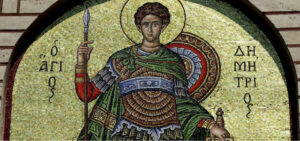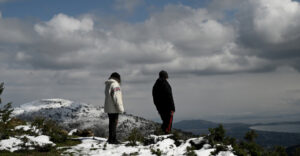Saint Demetrius, whom we celebrate every year on this day, October 26, the miraculous patron saint of Thessaloniki, is one of the most popular and honored saints of the Orthodox Church.
Born in 280 AD and martyred in 306 AD during the persecutions of Diocletian, Saint Demetrius has been recognized in the Catholic, Anglican and Lutheran Churches as well. However, in the Orthodox Tradition, he holds a special place because of his miracles and his direct connection to Thessaloniki, a city in which he has been considered the patron saint and protector for centuries.
Martyrdom in Thessaloniki
Demetrius was originally from Thessaloniki and was an active member of the Christian community during times of harsh persecution against Christians. Under Diocletian, and especially during the period of Galerius, when persecution was at its height, St Demetrius was arrested for his Christian activity and support of the faithful. The Chalice Lodge, in the area of the Roman Forum, was a place of meeting and prayer where the Saint supported his fellow citizens both materially and spiritually, a fact that angered his persecutors. He was arrested and detained in the underground prisons of the stadium, where he was martyred in 306 AD, refusing to renounce his faith. His memory was preserved by the early Christians, and his burial took place in the same place where he was held as a prisoner.
Nestoras and the Miracle against Lyagius
One of the most significant episodes in the life of Demetrius is connected with his disciple Nestor and his duel with Lycaeus. According to tradition, Demetrius strengthened Nestor with his prayer, leading him to victory over Lyagius, a sturdy and invincible gladiator. Nestor cried out “The God of Demetrius, help me” and succeeded in killing the Lycian, incurring the wrath of Galerius. Galerius, enraged by Nestor’s victory and the impact it had on the Christians of Thessalonica, ordered the killing of both Nestor and Demetrius himself.
The Miracle of Myrrh and the Protection of Thessaloniki
Saint Demetrius is not only recognized as a martyr, but also for his miracles, which makes him particularly beloved in the Orthodox tradition. According to popular tradition, the myrrh that comes from his tomb was proof of his holiness and attracted numerous pilgrims. This miraculous myrrh is seen as a source of protection for the faithful, while Demetrius himself is often depicted as a myrrh-blower, projecting his blessing to Thessaloniki and its inhabitants. In the city, the honour of Saint Demetrius is continuously maintained, with tradition claiming him as a miraculous defender of the city in times of siege, such as in 1207, when the Bulgarian ruler Ioannitzis died suddenly while besieging the city. According to sources, Ioannitzis was supposedly struck by a horseman with a spear, whom the Thessalonians identified as St. Demetrius, reinforcing the myth of his protection over the city.
The Worship of the Saint and his Temple
The Church of Saint Demetrius in Thessaloniki, one of the most important in the Byzantine world, was built in the 5th century and was a reference point for the pilgrimage of Christians. Built in a five-aisled basilica, the church was a gathering place for the faithful and confirmed Demetrius’ position as the patron saint of the city. Its construction had a significant influence on the artistic tradition of the city, hosting illustrations of the saint, and highlighting him as a model of faith. In the underground bath of the church, the crypt is preserved, which is considered the place of the Saint’s martyrdom and where divine services and holy water are still celebrated today.
From History to Modern Tradition
“Demetria”, the historical festival that took place from the Byzantine era until the 14th century, has been revived in modern times as a leading cultural event of the city. The events, which took place close to the feast of Saint Demetrius, had a religious and commercial character, and were a meeting place for the inhabitants of the wider area. Over the years, Demetria evolved into a framework of cultural events, with the Municipality of Thessaloniki organizing theatrical performances, art exhibitions and musical events, reinforcing the historical and cultural importance of the institution.
Agios Demetrios in the Orthodox and Slavic Tradition
The influence of Saint Demetrius extends throughout the Orthodox and Slavic world, where he is venerated as a patron and miracle-worker, with the title “Myrblical” indicating his continued holiness. Folk traditions in the Balkan and Slavic regions incorporate Saint Demetrius into religious and cultural manifestations of everyday life, with believers invoking his help for health, protection and well-being. From Serbs to Bulgarians, the cult of Demetrius is well established with numerous temples and monasteries dedicated to his memory.
The importance of Demetrius for Orthodox Christians and especially for the Thessalonians is not only reflected in the ecclesiastical services, but also in the countless works of art that depict the life and martyrdom of the saint. From frescoes in monasteries to portable icons, Saint Demetrius is depicted as a warrior with a spear or as a glorious martyr, giving him a powerful symbolism as a fearless defender of the faith.
Symbolism and Cultural Heritage
Thessaloniki, which traditionally honors Saint Demetrius with great litanies and solemn services, finds in him a symbol of unity and faith, with his annual feast attracting crowds of believers from all over Greece and abroad. The festival of “Demetria”, revived in 1966, highlights the historical and cultural heritage of the city, consolidating the connection of modern Thessaloniki with its past and its faith.
Saint Demetrius, with the history and myth surrounding him, represents a constant presence in the religious and cultural identity of Thessaloniki and the entire Orthodox world. From his protection of the city at critical historical moments to the personal guidance and help that the faithful attribute to him, Saint Demetrius symbolizes Thessaloniki’s timeless connection with tradition, strength and devotion to the Christian faith.
Ask me anything
Explore related questions





